
At least for now, Birds of Prey (and the Fantabulous Emancipation of One Harley Quinn) is the rare comic book movie to misfire at the box office, coming in 24% below the most conservative projection for its domestic opening weekend and 38% short of the most bullish. The experts said this girl gang flick - starring, directed, written, and produced by women - had a real shot at reaching as high as $55 million. The studio, Warner Bros., guessed it would be more like $45m. Instead, it earned an estimated $33.3m, the lowest opening for any DCEU title (previous record holder Shazam! opened to $53m) and the worst debut for any comic book title since last year's disastrous Dark Phoenix, a movie so bad even Bob Iger dunked on it in a Disney earnings call.
Hope springs eternal, of course. With solid reviews and hopefully good word of mouth, Birds of Prey could rebound from this, especially with the Valentine's Day/President's Day holiday weekend coming up. Plus, there's always the potential for salvation from the international box office. The profitability ceiling, after all, is relatively low thanks to Birds of Prey 's modest $84.5m budget. However, in this specific moment, it sure seems like Warner Bros. took one of DC's best-selling comic book heroines and steered her toward box office ignominy.
Obvious question: WTF?
Follow-up question: No, seriously, what the heck happened here?
And what does this have to do with Alita: Battle Angel?
Harley Quinn and the Opposite of a Fantabulous Box Office
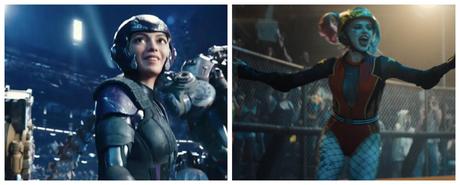
There are many nuanced reasons why Birds of Prey underperformed - the R-rating, overly whimsical title, lingering Suicide Squad hate, lackluster trailers, Joker fatigue?, a general failure of the marketing to help audiences understand any of the characters not-named Harley Quinn, etc. However, we don't live in an age of nuance. To many, this will simply be summed up as follows: "get woke, go broke."
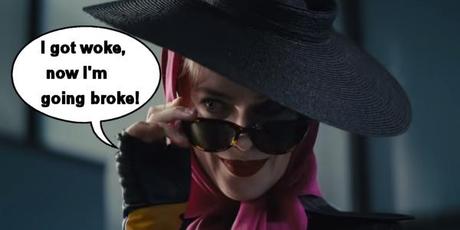
The argument goes like this: they turned Harley into the mouthpiece for yet another predictable feminist fantasy about how all men (the unseen, but oft-referenced Joker, Ewan McGregor and Chris Messina's cartoonishly sexist villains) are evil and all women (Black Canary, Huntress, Cassandra Cain and Renee Montoya in addiction to Harley) are amazing, and they suffered the economic consequences!
That's not me guessing. That, as of this writing, is the gist of the latest comment in response to CinemaBlend's article about Birds of Prey's box office woes. "WB needs to realize that Comic Book fans & Fans of movies are tired of the Feminist BS," someone called WhiteNoise wrote. "The whole, Women are Awesome and Men are Shit has worn thin on the audience it should be attracting."
To others, this further confirms what they argued last year: we need more movies like Alita: Battle Angel and fewer like Captain Marvel.
But, God, they can't be right, can they?
Let's back up.
Alita vs. Captain Marvel
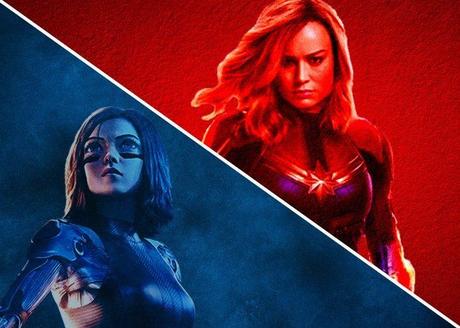
Last May, the Academy of Motion Picture Arts and Sciences asked its followers on Twitter to name the one movie they felt needed to be seen in a cinema. The thread was quickly flooded with users advocating for one surprising choice, Alita: Battle Angel, a failed franchised-starter that was playing in less than a hundred domestic theaters at that point. Strange, but good on them. James Cameron and Robert Rodriguez surely appreciated the support.
That was hardly an isolated incident, though. Collider and Rotten Tomatoes saw the same exact thing happen on Twitter when they rather innocuously asked followers to name their favorite film of the year. Once is an oddity, three times a trend. Entertainment journalists, like Adam White at The Independent, dug deeper and discovered there did indeed exist an online network of genuinely devoted fans calling themselves the #AlitaArmy and advocating on behalf of the film in the hope of convincing Disney to greenlight a sequel. (No dice, so far.)
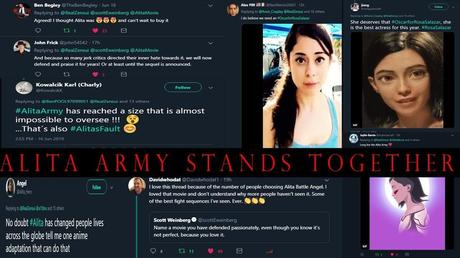 You do you, Alita fans.
You do you, Alita fans. Their movement, however, had been co-opted. Alt-right celebrity Jack Posobiec popularized support for the #AlitaChallenge, an online campaign to drive as much business to Alita as possible in the hopes of shaming that "pandering SJW crap" Captain Marvel. Remember, Alita and Captain Marvel came out within three weeks of each other, and the alt-right despised the latter. Every time Brie Larson, Kevin Feige, or someone else at Marvel uttered some variation of the phrase "female representation," the alt-right threw up in its collective mouth.
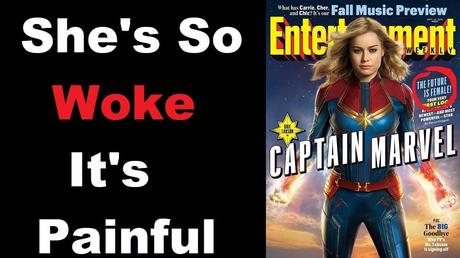 Argues one alt-right critic.
Argues one alt-right critic. To these people, Captain Marvel was shouting "give us your money because, ya know, feminism and SJW" while Alita steered away from preaching at you in favor of more politely selling a solid, apolitical story with a well-rounded heroine. Those who've actually seen both films know this oversimplistic binary is bullshit. As White pointed out, "In truth, [ Alita]'s arguably even far more liberal in its politics than many of the 'SJW' movies the #AlitaArmy have waged war against - featuring none of the military fetishism of Captain Marvel, nor the performative, widely criticized 'girl power' lip service in the likes of Avengers: Endgame or X-Men: Dark Phoenix."
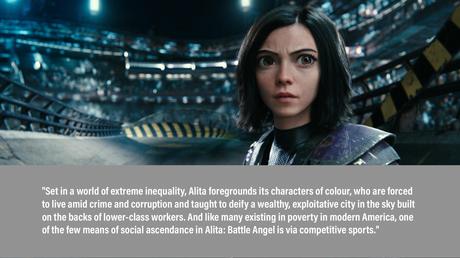
Beyond that, it's not exactly as if Alita's star Rose Salazar was the anti-Brie Larson, someone far less inclined to fuse her personal politics with her celebrity. Quite the contrary. "We're here to stay, baby," Salazar told Variety, in reference to Latinos in Hollywood and, by extension, the entire country. "Ain't no wall going to keep us out... just being a Latinx actress at the helm of something like this in itself is a message. You know I carry my name with me wherever I go. I'm Rosa Bianca Salazar, and this is the next wave of Latino casting."
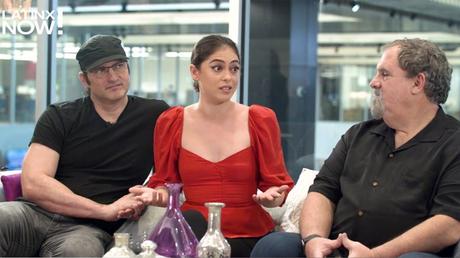
To those who felt seen and moved by Alita, Salazar's advocacy was part of the film's power. To those just looking for a proxy to be used in their war against Captain Marvel, it was something to be ignored and minimized. Rose, the argument went, can be loud and proud for Latinx women all she wants because you know what? At least her movie doesn't use No Doubt's "I'm Just a Girl" to underscore a climactic fight scene like it was a g-damn, lazy, feminist Macy's commercial! Alita, by contrast, one vlogger argued, "doesn't talk down to the fans, is believably powerful, attractive without being overly sexualized [...] the perfect wife, the perfect daughter, and the perfect friend."
None of this ultimately mattered to the bottom line. Like virtually all live-action movie adaptations of anime properties, Alita struggled to find a domestic audience and made up just enough of the slack overseas to maybe eke out a tiny profit but not to the point that a sequel has any realistic shot of happening. Captain Marvel, meanwhile, broke records around the world. It made more domestically ($426m) than Alita did globally ($404m). Captain Marvel 2 is now officially on track for a 2022 release. Granted, Marvel has hired a new writer for the sequel and is currently looking for a new director, signaling a desire for a creative shake-up, but Avengers: Endgame will not have been the last time Brie Larson flew through the MCU.
In this case, if you subscribe to the alt-right's framing of things, Marvel went "woke" but most certainly did not go "broke." Consider it the exception that proves the rule. (See also: Wonder Woman, Black Panther, Hustlers, Little Women.) In society's ongoing culture wars, that's one win for the liberals and a big loss for the trolls. They are keeping a scorecard, ya know, and even with that one loss they sure think they're winning.
Get Woke, Go Broke

According to KnowYourMeme, the "Get Woke, Go Broke" movement can be traced back to Milo Yiannopoulos, because it just wouldn't be an alt-right story without him. To be fair, in this case the origin doesn't go directly to him but instead to the news site he runs, Dangerous.com. In April 2018, it published an article about "sci-fi author John Ringo, which quoted Ringo using the phrase 'get woke, go broke' in the context of organizations that cave 'to SJW pressure.'" The phrase was quickly ported to Urban Dictionary and later parroted by YouTube gamers, all of them male.
Now, multiple right-leaning sites maintain running lists of every single film, TV show, video game, comic book, celebrity, media organization, and corporation to cave to SJW pressure and suffer the economic consequences as a result. Like so much else about our current cultural moment, it's a movement born out of shifting power dynamics, an anxiety-ridden reaction to too much changing too fast. Now, whenever anything with the stink of "progressivism" on it falters, their worldview is reinforced, creating some prime trolling opportunities.
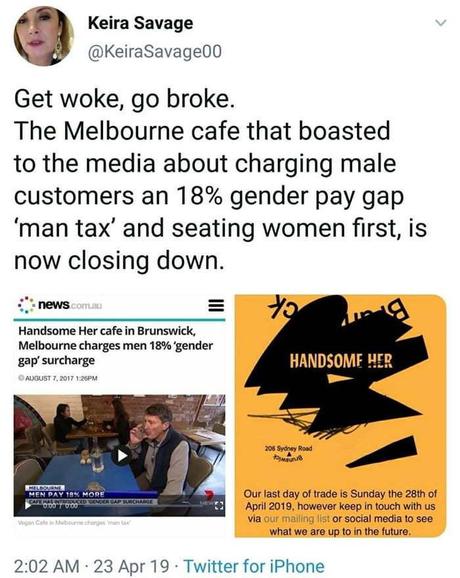
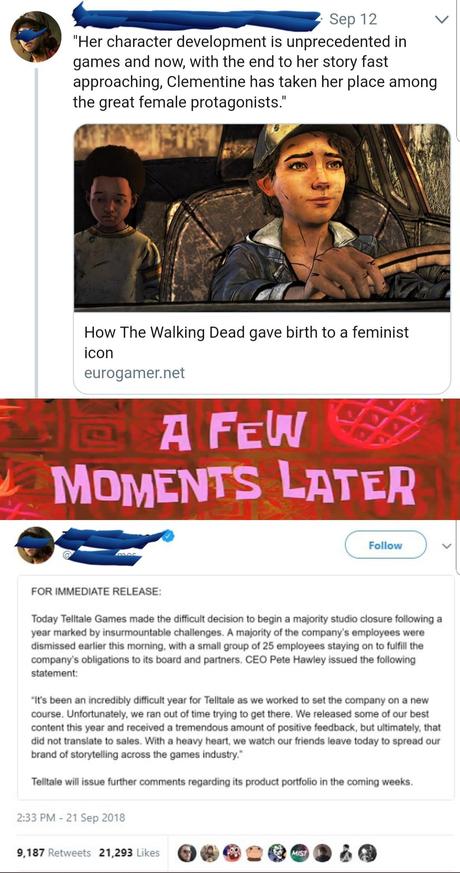
Anything that doesn't fit the narrative?
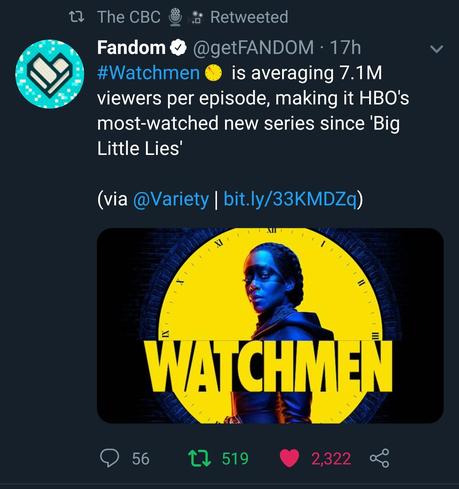
You can just ignore that, or you can spin it to your favor, as one Reddit user argued in this case: " Watchmen should be a benchmark for how 'woke' stories should be told. It doesn't sacrifice its complexity for stock minority characters who parrot progressive perspectives to perpetuate the illusion of 'wokeness', and mixes in real-world events that move the story forward while also teaching the audience about past events."
That's the thing: many who subscribe to the "get woke, go broke" meme will tell you they're not misogynists or racists. They are fans, just like anyone else, fans who are tired of being told something is great just because it's so woke and if they don't agree then clearly they're just racist sexist assholes. A movie can have a feminist message, but is it too much to ask for a good story to go with the message? And, please, when a movie like that fails don't go blaming men for not buying enough tickets. Plenty of women could have bought tickets. They didn't.
Elizabeth Banks vs. The Internet
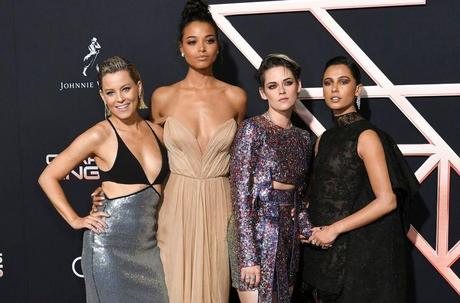
Elizabeth Banks begged to differ last year. Prior to the release of her multi-cultural Charlie's Angels reboot - headlined by Kristen Stewart, Naomi Scott, and Ella Balinska - she told the Herald Sun, "Look, people have to buy tickets to this movie, too. This movie has to make money. If this movie doesn't make money it reinforces a stereotype in Hollywood that men don't go see women do action movies."
Sadly for her, neither men nor women went to see Charlie's Angels, utterly rejecting it to the tune of just $70m worldwide, a cataclysmic result for a movie that cost around $50m to make. That's in stark contrast to Bank's prior directorial effort, 2015's Pitch Perfect 2, which faced a comparatively more crowded marketplace than Charlie's Angels - it opened the same weekend as Mad Max: Fury Road, one week before Tomorrowland - and still managed to eventually gross 10 times over its budget worldwide.
Films fail all the time, and as I previously detailed Hollywood has hit the scraping-the-bottom-of-the-barrel phase of its IP obsession. Charlie's Angels failing was hardly unique. The same month it came out also saw complete box office misfires by Doctor Sleep and Terminator: Dark Fate. Hollywood is increasingly adept at making movies no one was actually asking to see.
Banks, however, was understandably proud of Charlie's Angels and quick to contextualize its failure as a reflection of systemic sexism. When asked by the Wall Street Journal why she decided to make the fourth different version of the Charlie's Angels franchise, she shot back, "You've had 37 Spider-Man movies and you're not complaining I think women are allowed to have one or two action franchises every 17 years - I feel totally fine with that."
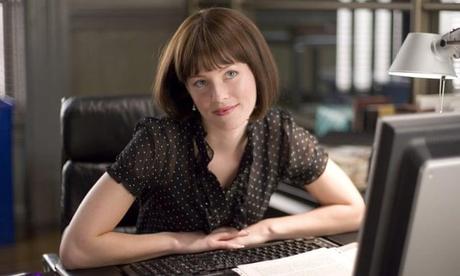 I always thought she was underused in those movies.
I always thought she was underused in those movies. She came by that opinion honestly. Banks portrayed the bit character Betty Brant in all three Sam Raimi Spider-Man movies, after being rejected for the Mary Jone Watson lead role due to being too old even though she and Tobey Maguire are basically the same age. (Brant has since been rebooted and played by Angourie Rice in the Marvel Cinematic Universe.) Since Banks left the comic book space, Wonder Woman and Captain Marvel each appeared to shatter the glass ceiling for female-fronted comic book movies, but in her mind, that was still a case of women succeeding on men's terms:
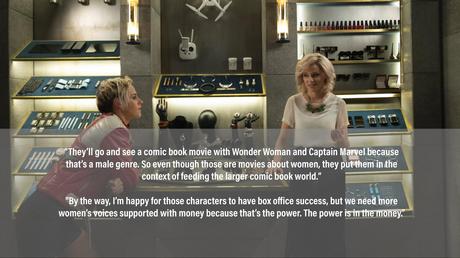
An internet shitstorm soon followed, with Banks under siege from both sides of the cultural aisle, the right playing the scapegoat/victim card and the left making nuanced arguments about how Wonder Woman was actually the rare blockbuster to score a 50/50 male/female audience. All of this before Charlie's Angels had even opened. When it did and promptly flopped, Banks was in good, if somewhat self-deprecating spirits on Twitter:
Well, if you're going to have a flop, make sure your name is on it at least 4x. I'm proud of #CharliesAngels and happy it's in the world.
- Elizabeth Banks (@ElizabethBanks) November 18, 2019
Weeks later, she scored her next gig: directing and starring in a remake of Universal's oft-forgotten Invisible Man spin-off Invisible Woman. Little is known about the project but given the battered women vs. evil men narrative of Universal's forthcoming Invisible Man remake from Blumhouse and director Leigh Whannell it seems highly likely that Banks is not backing down from the trolls. As she told IndieWire, "Of course, those trolls are horrifying, but you know, I challenge them to get up and make a fucking movie action movie. I welcome any of them into my realm."
Her critics, however, happily list Charlie's Angels as a "get woke, go broke" victim.
Black Christmas Vs. The Fans
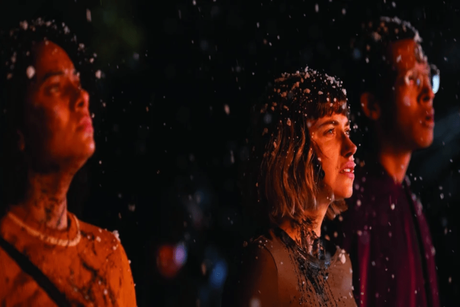
Also on that "get woke, go broke" list is Blumhouse's recent Black Christmas reimagining, the proud owner of just $18.5m in worldwide box office.
Some backstory: In 1974, future Christmas Story director Bob Clark made a proto-slasher about a deranged, mysterious man named Billy hiding out in the attic of a sorority house, placing phone calls downstairs and spouting misogynist jibber-jabber at anyone who answers, and gradually knocking off the residents one by one, none of whom realize those crazy phone calls were always coming from inside the house. You never get a good look at the killer's face nor do you ever learn his motive, which is exactly the kind of mystery that helps a film like that endure in popular memory.
Horror hounds now regularly debate whether John Carpenter's Halloween is a conscious Black Christmas rip-off. (I say no.) Regardless of where you fall in the argument, Bob Clark's spunky little flick remains for many a mandatory re-watch every time December rolls around. That means every year audiences are reminded that Black Christmas is secretly about abortion. The newly-pregnant lead character spends most of her screen time struggling with a controlling boyfriend who demands that she keep the baby despite her preference for an abortion. (Roe v. Wade, remember, had been decided just one year earlier.)
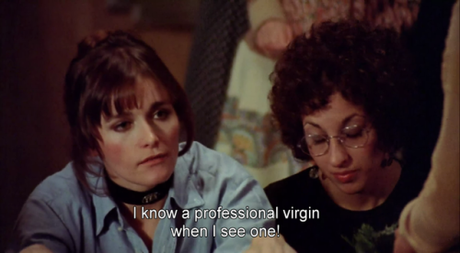 Margot Kidder, meanwhile, steals laughs as a boozy comic relief side character.
Margot Kidder, meanwhile, steals laughs as a boozy comic relief side character. X-Files/ Final Destination alum Glen Morgan directed/wrote a remake in 2006 headlined by Katie Cassidy, Mary Elisabeth Winstead, Michelle Trachtenberg, and Oliver Hudson. It's not without its charm. For fans of the original, at least the remake tells the same basic story, albeit with more backstory for Billy this time.
Blumhouse went a completely different direction with its remake. Announced less than six months before its release date, this Black Christmas was entrusted to mumblecore actress-turned-horror-director Sophia Takal, then mostly known for her 2016 thriller Always Shine. Along with co-writer April Wolfe - a film critic/podcaster making her feature writing debut - Takal looked less to Bob Clark's work and more to something like 2015's campus rape documentary The Hunting Ground for inspiration. They cranked out a version of Black Christmas all about sexually assaulted sorority sisters first uncovering and then defeating a - spoiler - a fraternity that ingests "a black goo contained within the bust of the college's racist, sexist founder" and then mindlessly kills women on campus to maintain white male power. Worse yet, they've been doing it for hundreds of years.
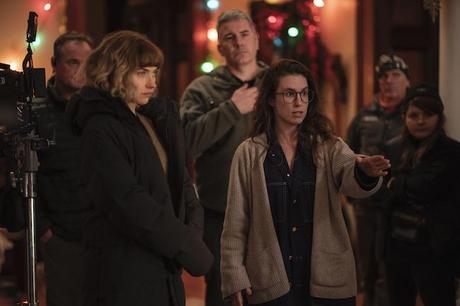
That bit of supernatural business places this squarely in the horror realm. A large majority of the drama, however, derives from the lead character (an excellent Imogen Poots) coping with the lingering trauma she feels from having been raped by a fraternity president. By Takal's way of thinking, her Black Christmas is "all about taking power back" and does sort of honor the 1974 original by trojan horsing a very of-the-moment social commentary - sexual assault, campus rape, #MeToo here, newly passed abortion laws then - inside a horror movie.
Fans weren't having it. Where's Billy? Why settle for a PG-13 rating? Why even call this Black Christmas when you're just doing a fraternity vs. sorority story? Not helping matters was a trailer that gave away just about every single twist but simplified the story into evil men vs. righteous women. (In the actual film, some of the sorority sisters turn on each other and a couple of the men are at least somewhat sympathetic.)
Pretty quickly, there were more people arguing about Black Christmas online than there were actual people paying to see the film in theaters. It was a lot of noise for one of Blumhouse's worst box office performers. Joe Bob Briggs, writing in his new Fangoria column, weighed in:
Horror audiences are very forgiving. They will champion movies that fail at the box office long after they've been abandoned by the mainstream. The one thing they won't forgive is a filmmaker who seems to be condescending to the genre, and that's what this feels like. Again, I don't think it's true, because we know who made it. But whatever shortcuts they took on the script led to a feeling that they were a little too in love with the Ivy League snappy-patter scenes and extremely contemptuous of the kill shots. Did they even spend ten bucks on special effects makeup?
In other words, nobody would care about the speeches condemning the patriarchy if they were backed up by suspense, shock, tension, and, uh, horror. It's possible for mumblecore to cross over into mumble gore-I think House of the Devil is a superb example-but only if you get out of your head and start digging down into the sources of fear.
-Joe Bob Briggs
This was in direct contrast to a prior Fangoria editorial arguing that any white male who didn't like the movie needed to re-examine his prejudice and privilege.
It was the "get woke, go broke" movement in microcosm, with right-wing trolls review bombing Black Christmas on IMDB, critics arguing over nuance, and a film that Takal designed with the hopes of exposing viewers to an alternate worldview ultimately reduced to preaching to a small choir.
Wrapping Up
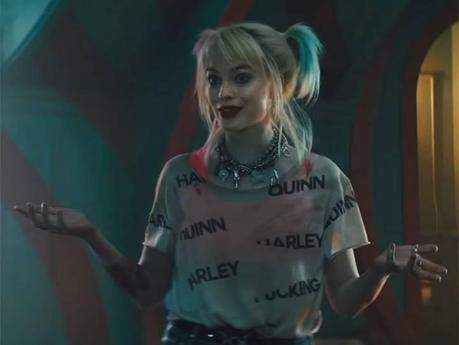
The internet broke fandom. Movies aren't just movies anymore; they're proxies in culture wars, signifiers to point to as evidence as what kind of person you are and what worldview you hold. SEO incentives rage and passion. Rather than converse with nuance, we proudly yell "get woke, go broke" or, on the opposite end, accuse anyone who doesn't like our favorite thing of being a privileged asshole.
We live, however, in complicated times. For example, Charlize Theron produced and starred in Bombshell, a feminist #MeToo drama about Megyn Kelly, a woman who refuses to ever be called a feminist, and no one knew how to feel about that. Critics, including our very own Julianne, seem to really adore Birds of Prey, and audiences just don't care. There is a recent precedent for similar good women vs. evil men films struggling, but there's also recent precedent for distressed IPs struggling regardless of gender politics.
What exactly happened here? So many different things conspiring at once. However, the "get woke, go broke" movement just netted another talking point, and those fans of girl team-up movies just got a pretty rough one-two punch with Charlie's Angels and Birds of Prey flailing.
This is now the moment where Hollywood's relatively recent commitment to diversifying its comic book franchises will face its toughest test. It's relatively easy to greenlight female-led superhero and actions when everything seems to be hitting big. What happens when you hit a couple of speed bumps? In year's past, we'd get Aeon Flux and then nothing like it for another ten years. As Elizabeth Banks said, the real power comes from the money and it's damn difficult to overcome the longstanding assumptions about what kinds of movies sell.
I'll close with something Michael Stipe recently told Vulture about the current state of the world:
"If you talk to my more woo-woo friends, they're gonna tell you that this is the beginning of the Age of Aquarius, and the age that we're coming out of is the end of the alpha male. But he doesn't go easy. So he's gonna claw. He's gonna cling. And he's gonna be pulled away screaming and kicking. I do feel that we're moving toward something that is more inclusive and progressive, but we're having to go through pretty dark times to get there."
One thing is certain: Harley will be back for James Gunn's The Suicide Squad.

